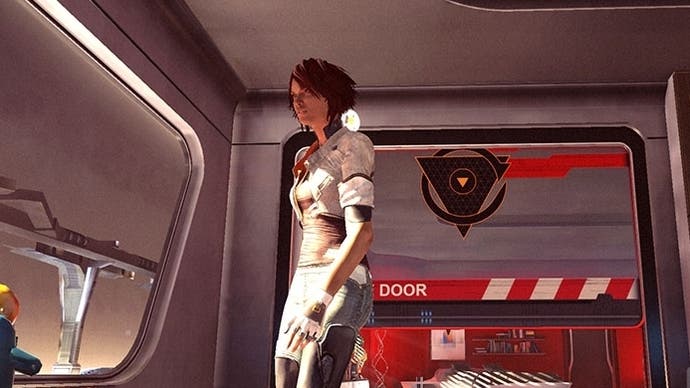The Double-A Team: Remember Me's mind games
Life is strange.
The Double-A Team is a feature series honouring the unpretentious, mid-budget, gimmicky commercial action games that no-one seems to make any more.
You can catch up with all of our Double-A Team pieces in our handy, spangly archive.
"The past is a different country," says a character with the deliciously preposterous name Johnny Greenteeth. This incomplete and ironically misremembered quote is not a reference dropped into the script here for a dose of unearned gravitas. Rather, while Remember Me is ostensibly a platform beat-'em-up set in a gorgeously fractured futuristic Paris, it is also an exploration of the power and fragility of human memory.
With the 22nd century visible on the horizon, a company by the name of Memorize develops a technology known as Sensen. Memories, once the ultimate form of privacy, have been untethered from the human mind. Memories can now be easily removed. They can be lent to friends and loved ones, used as currency in transactions, and generally manipulated to enrich the human experience. Naturally, there is a dark side to this.
As you walk through (and leap high above) the streets of Neo-Paris, evidence of this brave new world is everywhere. The rich and opulent corners of the city, impossibly clean, are full of cheery Memorize advertisements, and - if you take the time to window-shop - promises of wonderful experiences through the memories of others. By contrast, the dark and ruined slums are a living, broken memory that the privileged do their best to forget. Echoes of Memorize's promises are seen in rickety market stalls and functional advertisements, at least one making an ominous request for a memory deposit.
Memories are also, to many, a drug. Memory addicts, helplessly lost in a muddle of reminiscence, can often be seen cowering in the slums. "I just want to remember something happy," one sobs as I pass. What are we if not an accumulation of our experiences? The implication is that the more you remember from other lives, the less 'you' you become. The culmination of this journey is to become an animalistic Leaper.
Combat channels memory on two levels. Firstly, it relies on specific customisable combos, offering a mix of damage, healing, and special move cooldowns according to how you construct them. You must therefore remember the correct button sequences according to your current need. Secondly, you have access to a finishing move you're encouraged to use by the name of memory overload. You overload the memories of your foes. What a monstrous, brutal, and highly effective way to end a fight.
Your character - Nilin - is a memory hunter. She has the ability to steal memories. In mechanical terms, this usually means discovering secret routes and access codes. Much more interesting is her ability to remix - that is, alter - the memories of others. The remix sequences show memories for what they are: subjective, fuzzy around the edges, and much more malleable than we would like to believe.
The objective of a remix is to find and trigger the correct sequence of changes that result in a different outcome in a subject's recollection of an event. The first remix, for example, instantly changes an enemy into a friend by making her believe that a Memorize doctor killed rather than saved her husband. Of course, nothing has changed in the physical world, but let me (and the game) ask you this: where does the past exist, if not in the shattered labyrinth of memory?
I have so much to say about the events of the final chapter, but I will say nothing, because I urge you to play this game yourself. Instead, I will just note that, while Remember Me preceded Pixar's Inside Out by two years, they rather unexpectedly reach precisely the same conclusion via two very different routes. It's not only merely okay, but necessary to be sad sometimes. Moreover, we must treasure and protect the painful memories just as much as the happy ones; because only together can they create and maintain who we truly are.










